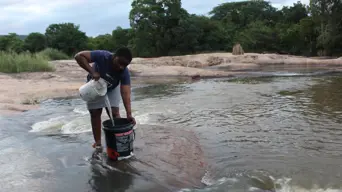Water: Government is failing to realise this human right
Since 1994, the government has made good progress realising the right to water. But the system seems to be breaking down. Joburg, our biggest city and the economic centre of our country, is in the middle of a water crisis, though the mayor denies it.

Residents of KaMajika Village near Hazyview collect water from the Kambeni River. Archive picture: Masoka Dube/GroundUp
Human Rights Day reminds us that in South Africa our rights are enshrined in the Constitution. Chapter 2 of the Constitution is the Bill of Rights. Section 27 states: “Everyone has the right to have access to … sufficient food and water”.
Since 1994, the government has made good progress realising the right to water. But the system seems to be breaking down.
Joburg, our biggest city and the economic centre of our country, is in the middle of a water crisis, though the mayor denies it. But this is just part of the story. Across much of South Africa, the provision of drinking water has broken down. To name just a few examples from many:
- In Verulam in KwaZulu-Natal, firefighters battled to extinguish a fire because the area has been without tap water for four months.
- For almost a decade, families in the Ugu District Municipality on the KwaZulu-Natal South Coast have been experiencing water outages, sometimes for weeks at a time, with no end in sight.
- In KwaXimba inThekwini, where some areas haven’t had tap water for seven years, Water Minister Senzo Mchunu has promised tap water by April.
- But in Musina in Limpopo, the same Minister Senzo Mchunu had to be whisked away by police from a crowd fed up with unkept promises about the water supply.
- Makhanda in the Eastern Cape has been battling water shortages for nearly ten years. An upgrade of the water treatment works began in 2015 and was supposed to have been completed by 2017 but has still not been finished.
- In QwaQwa more than 140,000 households are struggling with little or no tap water at all.
- In Mpumalanga, the Mbombela Municipality has been given less than three months by the Human Rights Commission to comply with national water provision regulations, and provide a minimum 25 litres of drinking water per person per day.
- Also in Mpumalanga, thousands of families in Carolina have not been able to drink the tap water for at least ten years, because it is contaminated by sewage.
- The amount of raw sewage flowing into the Vaal River catchment from broken or non-functioning infrastructure in Mpumalanga and the Free State is endangering the water quality in the Vaal Dam, Johannesburg’s only water source. Warnings have been sounded that should Gauteng experience an extended drought, the Vaal Dam may reach a point of eutrophication, meaning existing water treatment works will have to operate as desalination plants, compounding the existing water shortage in our most populous city.
- In Hammanskraal in Tshwane, people have died of cholera from dirty water. This should not happen in a middle-income country like South Africa in the 21st century. Cholera is a disease we’ve understood, been able to prevent and treat for well over a century.
The reasons for these serial failures include incompetence, the neglect of vital infrastructure, and corruption, at all levels. The effects are dramatic: people drinking dirty water from streams and potholes, elderly people walking kilometres to find clean water, or queuing at water tankers, families begging for water from neighbours and even having to buy water, which should be free, from profiteering companies and gangs.
Human Rights Day is a reminder that the right to clean water has not yet been won, nearly 30 years after the adoption in May 1996 of the Constitution in which this very basic right is guaranteed.
As Kariega resident Babalwa Nonkumbana put it best during yet another water cut: “When there is an electricity outage, at least we can use a gas cylinder. But when there is no water, you have nothing at all … and you can’t make your own water.”
This article first appeared on GroundUp. Read the original article here.